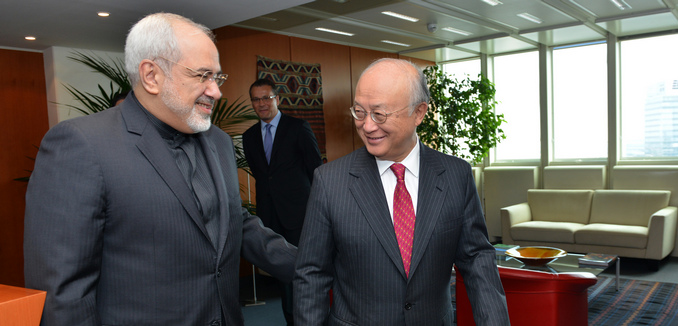The International Atomic Energy Agency (IAEA), which was charged with verifying Iran’s compliance with the 2015 nuclear deal, has failed “to establish a full picture of Iran’s nuclear ambitions,” Joshua S. Block, CEO and President of The Israel Project, argued in an op-ed published Thursday in The Hill.
Block noted that the IAEA took a skeptical approach to Israeli Prime Minister Benjamin Netanyahu’s revelations at the United Nations General Assembly that Iran had a nuclear warehouse in Tehran, and gave no indication that it would investigate the Israeli claims further.
The IAEA had previously failed to investigate the nuclear archives that Israel had smuggled out of Iran in January, even though the recovered documents and files contained details “about which international inspectors were unaware,” The Wall Street Journal reported in July.
The IAEA’s refusal to follow up on the Israeli intelligence coups aren’t the only instances where it has failed to establish a complete picture of Iran’s nuclear weapons work.
“Though it is charged with monitoring Iran’s compliance with the nuclear accord,” Block wrote, “at least twice the IAEA has acknowledged it was not verifying compliance.”
Yukiya Amano, the Director General of the IAEA, acknowledged in September 2017 that his agency did not have the ability to monitor Iran’s compliance with items mentioned in Section T of the nuclear deal. Section T governs “activities which could contribute to the development of a nuclear explosive device.” The IAEA’s inability or unwillingness to report on these activities meant that “the deal is not fully implemented,” according to David Albright, the president of the nonpartisan Institute of Science and International Security and a former weapons inspector.
Amano also had once said his agency would have to have access to military sites for the nuclear deal to be effective. But last year an IAEA official confirmed it would not ask for access to Iranian military sites so as not to give the U.S. an “excuse” to “bring down the deal.”
Block recalled that when President Barack Obama announced the nuclear deal in January 2016, he said that the deal included “the most comprehensive, intrusive inspection regime ever negotiated to monitor a nuclear program.” Obama’s statement showed that the guarantee that Iran would fully comply with the deal “was one of the central selling points of the accord,” Block observed.
Even before the deal was implemented, there were questions if the full scope of Iran’s illicit nuclear activities were known. The IAEA stopped investigating Iran’s past nuclear weapons work before it had “anywhere near a full declaration about its past nuclear weapons related activities,” Albright wrote in December 2015.
“The gaps in the IAEA’s knowledge — of Iran’s past nuclear work, of its military sites, of items mentioned in Section T of the nuclear deal, and of the nuclear sites discovered by Israeli intelligence — raise questions about the full extent of Iran’s nuclear program,” Block argued. “These gaps are important as we approach November when President Trump has said the United States will impose sanctions on Iran’s energy sector that could ‘cripple’ its economy.”
Defenders of the nuclear deal will claim that the IAEA has consistently confirmed that Iran was abiding by the terms of the deal. But all the IAEA has confirmed, Block wrote, is “that Iran didn’t blatantly violate the deal at any site that the IAEA has access to.”
What the IAEA’s disinterested response to Netanyahu has highlighted is that the nuclear deal “has too many holes, and the IAEA is unable — or unwilling — to address them,” Block concluded.
[Photo: IAEA Imagebank / Flickr ]




